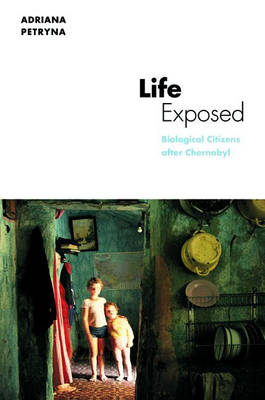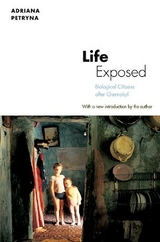
Life Exposed
Biological Citizens after Chernobyl
Seiten
2002
Princeton University Press (Verlag)
978-0-691-09018-4 (ISBN)
Princeton University Press (Verlag)
978-0-691-09018-4 (ISBN)
- Titel erscheint in neuer Auflage
- Artikel merken
Zu diesem Artikel existiert eine Nachauflage
On April 26, 1986, Unit Four of the Chernobyl nuclear reactor exploded in then Soviet Ukraine. More than 3.5 million people in Ukraine alone are still suffering the effects. This text examines the political, scientific and social circumstances that followed the disaster.
On April 26, 1986, unit Four of the Chernobyl nuclear reactor exploded in then Soviet Ukraine. More than 3.5 million people in Ukraine alone, not to mention many citizens of surrounding countries, are still suffering the effects. This text comprehensively examines the vexed political, scientific and social circumstances that followed the disaster. Tracing the story from an initial lack of disclosure to post-Soviet democratizing attempts to compensate sufferers, Adriana Petryna takes us into a world whose social realities are far more immediate and stark than those described by policymakers and scientists. She asks: What happens to politics when state officials fail to inform their fellow citizens of real threats to life? What are the moral and political consequences of remedies available in the wake of technological disasters??;pThrough extensive research in state institutions, clinics, laboratories, and with affected families and workers of the so-called Zone, Petryna illustrates how the event and its aftermath have not only shaped the course of an independent nation but have made health a negotiated realm of entitlement.
She tracks the emergence of a "biological citizenship" in whi
On April 26, 1986, unit Four of the Chernobyl nuclear reactor exploded in then Soviet Ukraine. More than 3.5 million people in Ukraine alone, not to mention many citizens of surrounding countries, are still suffering the effects. This text comprehensively examines the vexed political, scientific and social circumstances that followed the disaster. Tracing the story from an initial lack of disclosure to post-Soviet democratizing attempts to compensate sufferers, Adriana Petryna takes us into a world whose social realities are far more immediate and stark than those described by policymakers and scientists. She asks: What happens to politics when state officials fail to inform their fellow citizens of real threats to life? What are the moral and political consequences of remedies available in the wake of technological disasters??;pThrough extensive research in state institutions, clinics, laboratories, and with affected families and workers of the so-called Zone, Petryna illustrates how the event and its aftermath have not only shaped the course of an independent nation but have made health a negotiated realm of entitlement.
She tracks the emergence of a "biological citizenship" in whi
Adriana Petryna is Edmund J. and Louise W. Kahn Term Professor in Anthropology at the University of Pennsylvania. She is the author of When Experiments Travel: Clinical Trials and the Global Search for Human Subjects (Princeton) and coauthor of Global Pharmaceuticals: Ethics, Markets, Practices.
| Reihe/Serie | In-Formation |
|---|---|
| Zusatzinfo | 2 Maps |
| Verlagsort | New Jersey |
| Sprache | englisch |
| Maße | 152 x 235 mm |
| Gewicht | 539 g |
| Themenwelt | Naturwissenschaften ► Biologie ► Ökologie / Naturschutz |
| Sozialwissenschaften ► Politik / Verwaltung ► Staat / Verwaltung | |
| Technik ► Elektrotechnik / Energietechnik | |
| ISBN-10 | 0-691-09018-1 / 0691090181 |
| ISBN-13 | 978-0-691-09018-4 / 9780691090184 |
| Zustand | Neuware |
| Haben Sie eine Frage zum Produkt? |
Mehr entdecken
aus dem Bereich
aus dem Bereich



